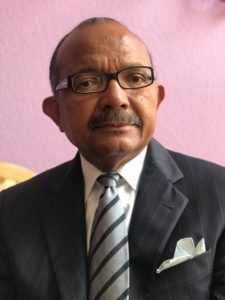Leader in social work education, administration and social justice advocacy
Colleagues describe John Oliver as the consummate social worker—a caseworker who “worked in the trenches,” an advocate for social justice, a visionary, teacher, administrator, mentor, researcher, consultant and leader, and a caring person who treats others with respect and dignity. In other words, he is seen as a role model not only for his fellow social workers, but for everyone whose life he has touched.
After completing his bachelor’s degree at Cal State Los Angeles in 1967, Oliver went on to earn his MSW at UCLA and a doctorate in Social Planning and Policy Development at Brandeis University. He began his career as a caseworker in child welfare, a field he remained committed to throughout his professional life. He taught at Simmons College and was acting dean and associate dean of the School of Social Welfare at the University of Wisconsin, Milwaukee, before joining the faculty of California State University, Long Beach, in 1988 as director of the Department of Social Work, which was later to became the School of Social Work under his leadership. In each of these positions, his gifts as an educator were recognized with awards for outstanding teaching.
In addition to his role as teacher, Oliver conducted research, edited professional journals, gave presentations and published widely on a range of topics, from minority recruitment in colleges to providing services for homeless clients and other vulnerable populations. As director of CSULB’s School of Social Work, he helped initiate and maintain a distance-learning program to provide rural areas of the state with professionally trained social workers. He also held leadership positions in professional organizations, including the Council on Social Work Education (CSWE), the California Social Work Education Center (CalSWEC), the California Association of Deans and Directors of Social Work Programs (CADD) and the California chapter of the National Association of Social Workers (NASW-CA). In 2004, he coauthored the Master Plan for Social Work Education in California.
In all his endeavors, Oliver stressed the value of social workers as change agents. To put this into practice, he developed a sequence of courses that required students to assess and address a community need and encouraged students and colleagues to become meaningfully involved in the places they lived. He founded food co-ops and self-help organizations, as well as chapters of the National Association of Black Social Workers.
Oliver has been the recipient of many awards, including the Lifetime Achievement Award from the NASW’s California chapter and the UCLA Outstanding Alumni Award, and he was elected to the Black Administrators in Child Welfare Hall of Fame. One colleague emphasized his profound impact on others, noting that whenever Oliver spoke, those who heard him “would be inspired to serve society to make it a better place for everyone.”